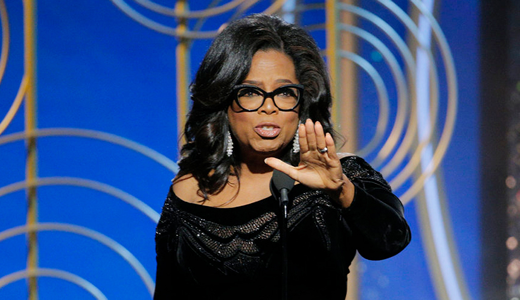The Golden Globes this year offered a lot of what awards shows typically offer: lots of awards, lots of star power, lots of sometimes awkward acceptance speeches.
Three Billboards Outside Ebbing, Missouri escaped the awards show with four Globes. HBO’s miniseries Big Little Lies scampered away with three. But this year, hardly anyone was talking about who actually won anything. Nope. Oprah Winfrey stole the show.
Winfrey, who accepted the Globes’ Cecil B. DeMille Award for lifetime achievement, climbed the stairs, stepped behind the podium and unleashed a seven-minute history lesson/speech/sermon that touched on racial inequality and focused on the #MeToo movement.
“I want all the girls watching here, now, to know that a new day is on the horizon!” she said. “And when that new day finally dawns, it will be because of a lot of magnificent women, many of whom are right here in this room tonight, and some pretty phenomenal men, fighting hard to make sure that they become the leaders who take us to the time when nobody ever has to say ‘Me too’ again.”
https://www.youtube.com/watch?v=fN5HV79_8B8
The speech brought the house to its feet a couple of times and left some celebrities in tears. Some speculated whether it might’ve been a launching pad for a Winfrey run for President.
No question, Oprah can make a fine speech, and I liked a lot of what she said. But in the midst of her eloquent, impassioned delivery, I caught something interesting: How she used the word “truth.”
For instance: “What I know for sure is that speaking your truth is the most powerful tool we all have.”
And then: “For too long, women have not been heard or believed if they dare speak their truth to the power of those men.”
And finally: “I just hope that Recy Taylor [a woman who was raped on her way home from church decades ago, and whose attackers were never brought to justice] died knowing that her truth, like the truth of so many other women who were tormented in those years, and even now tormented, goes marching on.”
Did you catch all that? Your truth. Their truth. Her truth.
Now, I don’t want to make too much of this linguistic distinction. Winfrey spoke of “the absolute truth,” too, when she spoke about the power of journalism. She was likely using the word “truth” as a stand-in for “story.” The way each of us experiences the world is unique. Our stories are unique and, in one respect, true.
And yet that’s not itself true, is it? We view the world with a level of bias and subjectivity. We see and hear things in a skewed manner. According to science, we sometimes forget crucial details of our own stories or embellish them without even realizing we’re doing it.
Winfrey’s word choice is also, I think, an interesting reflection of our time—and appropriately so, given that she’s perhaps the most powerful, most popular entertainment figure of our time. She has come to represent an expression of how society would like to view itself: persuasive and ethical while somehow being accepting and nonjudgmental, spiritual without being explicitly religious. And her use of phrases like “your truth” and “their truth” reflects how malleable many may believe the truth is.
We live in an age where the phrase “fake news” is bandied about constantly. Most of us get our news from sources that tilt to the left or right, from über-personal Facebook posts or opinionated Twitter feeds. We live in a culture that swims in stories. Few of us believe in ultimate arbiters of truth anymore. We listen to society’s noise and try, somehow, to discern the truth from what we gather.
None of that is necessarily bad. A healthy skepticism of the culture’s prophets and storytellers and town criers is always wise, I think. But because we don’t trust what people or sources tell us as readily as we once did, I think that some of us forget that, beyond all the noise, there is truth. We don’t each get to choose our own.
We all know that two and two is four. That is truth. We know that the moon affects the tides and the sun affects the seasons. That is truth. And as Christians, we know that our God is righteous and forgiving, all powerful and all loving. That, too, is truth. And He has some definite ideas how we should worship Him and carry ourselves, too. Those ideas are truth, as well, because he is Truth.
His truth. Her truth. Their truth. Semantics aside, there is only one truth: the truth. We don’t always understand that truth perfectly, but it’s out there, and it’s up to us to try to know that truth as well as we can—not create our own.
“What is truth?” Pilate asked Jesus, just as our culture asks today. Little did Pilate understand, and little do we sometimes, that the Truth was standing right in front of him.






Recent Comments